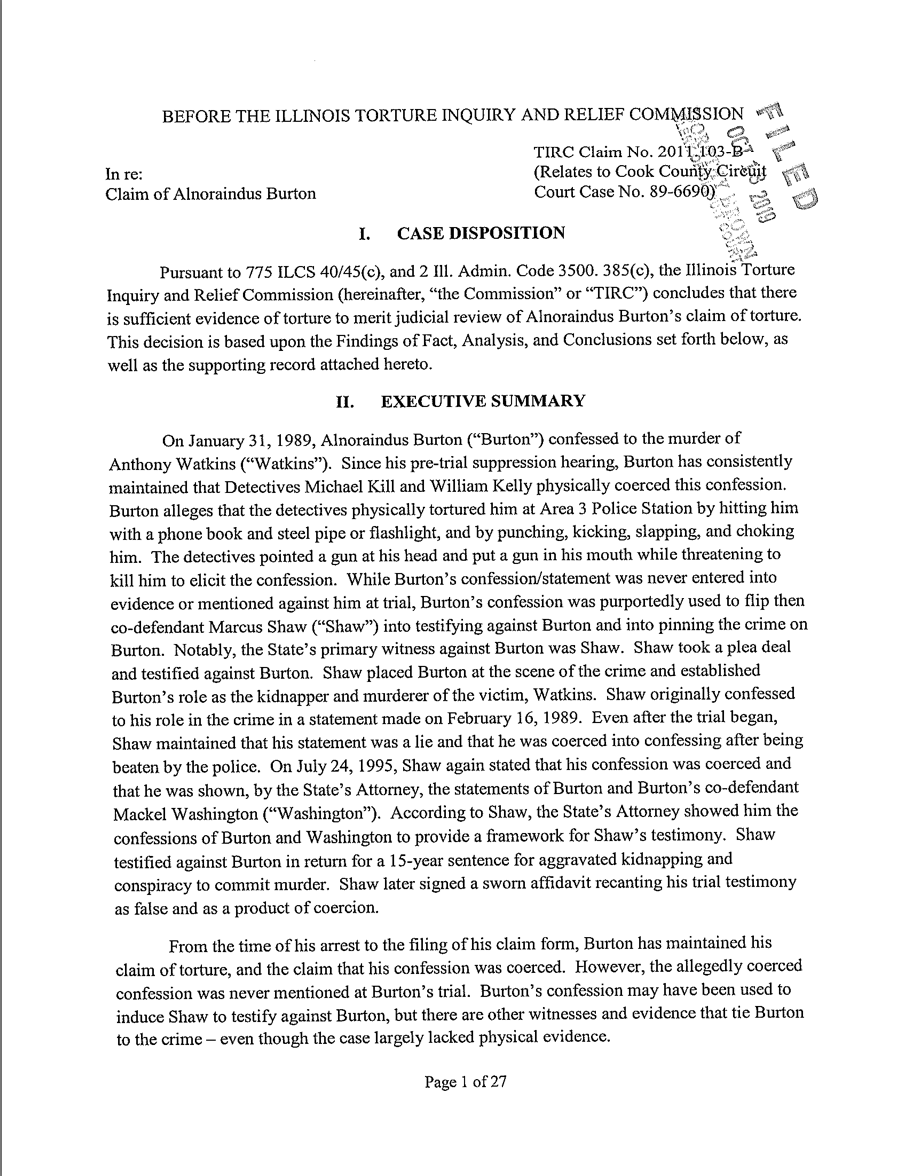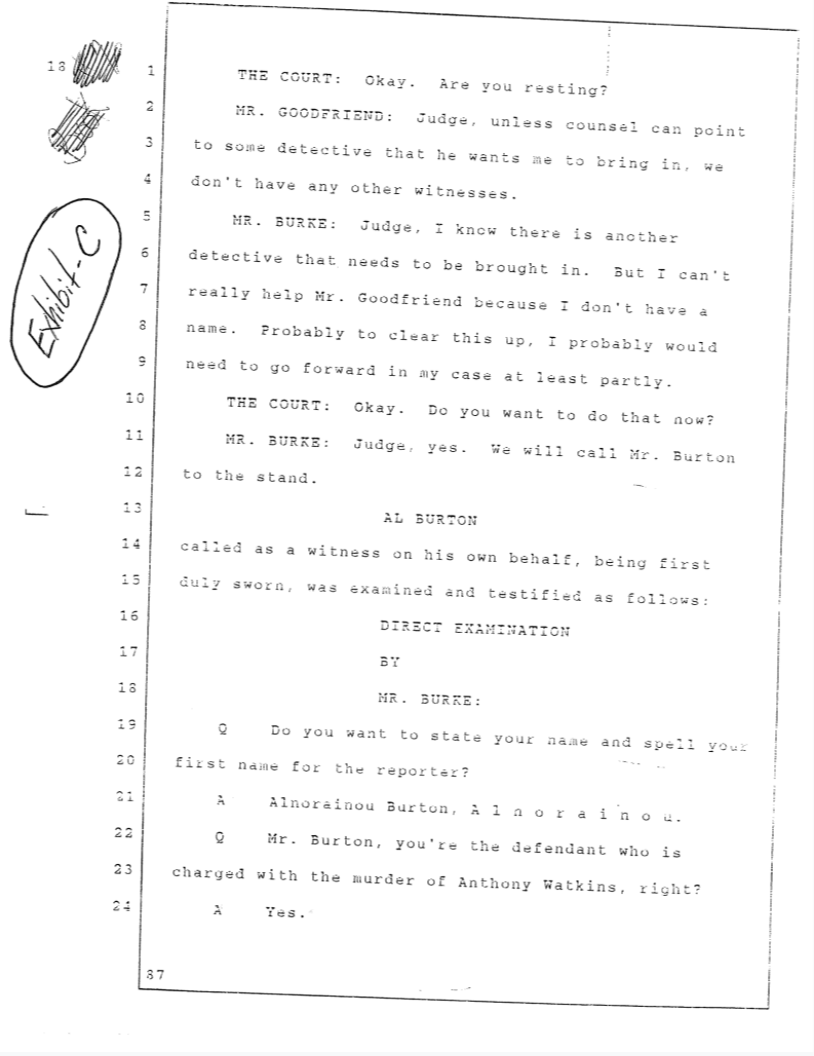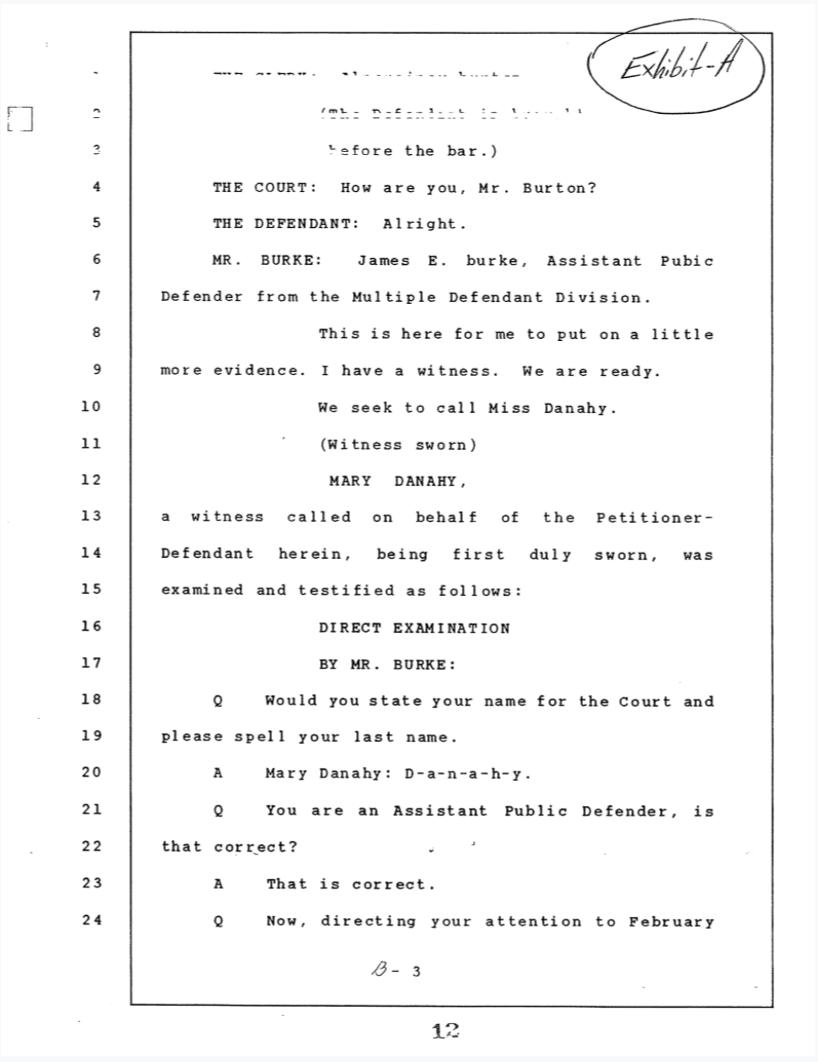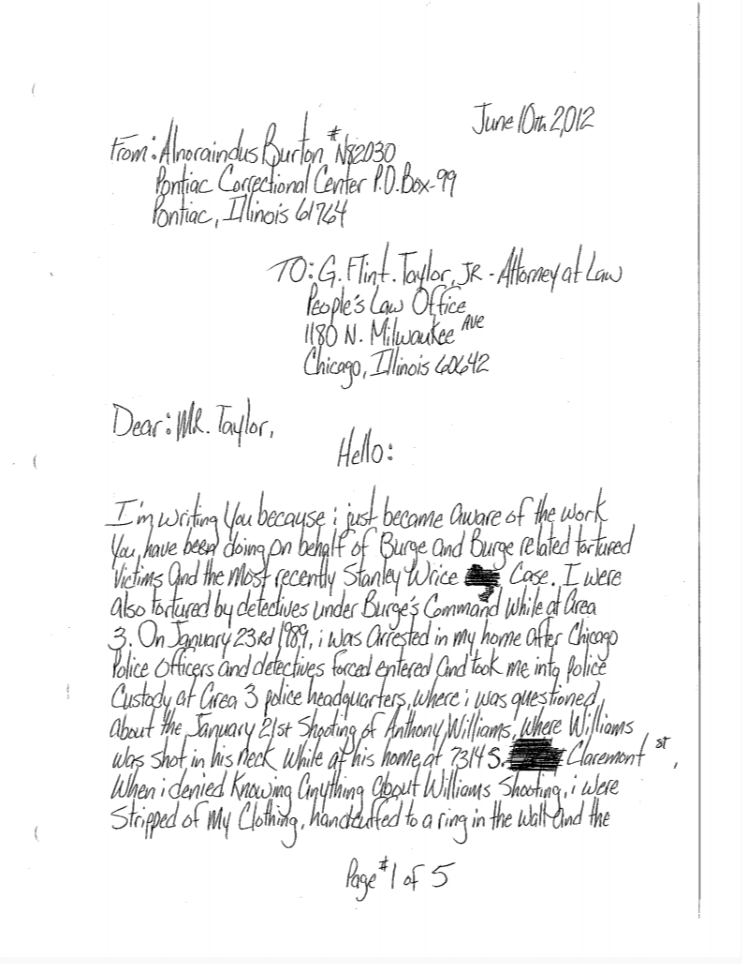Alnoraindus Burton has maintained that on the day that would change his life, January 29, 1989, he was going to buy marijuana and hang out with friends. After hearing what he thought were firecrackers, he said he went home. However, when Anthony Watkins’ body was found bound and shot in Englewood soon after, witnesses purportedly told police that Burton and co-defendants Marcus Shaw and Mackel Washington were responsible for the crime.
After police arrested Burton, they held him for days. He described humiliating and painful torture at the hands of Chicago detectives who worked for police Cmdr. Jon Burge.
Burton has maintained that he was framed for the murder of Watkins and that his confession was used to push Shaw to testify against him, which he did for a reduced sentence. Shaw later recanted his testimony, and Burton has consistently raised his coerced confession in appeals of his lifetime sentence, all of which have been rejected. As of September 2020, he remains imprisoned in Pontiac Correctional Center in Pontiac, Illinois. The Illinois Torture Inquiry and Relief Commission (TIRC) found Burton’s claims credible in 2019 and has formally recommended a new hearing to assess his case.
Arrest and torture at Area 3
Burton was asleep at his mother’s house when police raided the family’s home on January 30, 1989, and took Burton to Area 3 Chicago Police Headquarters, where Burge and those under his command worked. Over the course of the next six days, Burton said he was tortured and verbally abused by Area 3 detectives until he confessed to the murder of Watkins, a leader in the Gangster Disciples street gang.
In an emotional interview in 2017 with journalist Amanda Rivkin, Burton remembered being beaten with a phone book and detectives smashing his hand with a steel pole or flashlight. He said the officers offered no food or water. He also said they refused his pleas for a lawyer. Over that time, Burton said a detective later identified as William Kelly badly hurt Burton’s wrist when he smashed it with a metal object, and Detective Michael Kill choked him until he lost consciousness, among other unidentified officers Burton says beat him.
The men had opened the windows in the room, and it was freezing, Burton said.
At one point, Burton defecated on himself. “You beat the shit out of that nigger,” one detective joked, Burton recounted emotionally in the interview.
After a state’s attorney came in to get his confession, Burton again refused. Then, he said, one of the detectives put a gun in his mouth and choked him. “Please don’t let this man kill me,” Burton remembers thinking. “I didn’t have no more fight in me.” He soon signed a confession as a state prosecutor looked on, and then another version of the confession when the prosecutor demanded changes.
Trial for murder
Burton’s confession, though, was not entered into evidence against him during his trial in 1990. A trial judge, as the 2019 Illinois Torture Inquiry and Relief Commission investigation recounted, said Burton “was not believable at all” and said that police had properly read him his rights, despite Burton describing his torture in detail when he testified. A public defender also corroborated his injuries during the trial.
In August 1991, Burton was sentenced to life; co-defendant Washington received 80 years. Shaw, another co-defendant, asserted he had been threatened by the State’s Attorney with a life sentence or the death penalty if he did not cooperate. Because he did cooperate and pointed the finger at Burton, Shaw was instead given 15 years as part of a plea deal for his testimony.
There was no physical evidence presented at trial that Burton had murdered Watkins.
Burton’s claims rejected on appeal
After Burton was sentenced, Shaw later admitted his testimony was false and formally recanted.
In 1994, Burton’s conviction was upheld. Six post-conviction petitions that followed were all denied by Illinois appeals courts. In the last appeal, in 2016, the appeals court ruled that Burton had failed to show his coerced confession would have affected the outcome of his trial. “He has not established that the results of his trial would have been different if it had been revealed that Reese’s testimony was perjured since his statement was not used at trial,” Judge Robert E. Gordon wrote for the majority. “Thus, we also affirm the trial court’s denial of this claim on the ground that defendant failed to establish prejudice.”
In October 2019, the TIRC found that Burton deserved a new hearing based on the evidence of torture. They noted that Burton has sometimes been inconsistent about the dates involved in the case, but that his consistency in recounting his torture over the years pointed toward his claim’s truthfulness.
The TIRC also said that prosecutors'’ unwillingness to use Burton’s signed confession was suspicious because it “may indicate some perceived vulnerability on the State’s part in using the confession.” They wrote:
“The most challenging item for the TIRC commission to weigh is the fact that Burton’s confession was not used directly in his trial at all. The prosecution’s decision not to use such a detailed (sic) leads to the question of why. Shaw’s affidavit, however, connects Burton’s statement with his conviction, and suggest (sic) the reason why the prosecution decided not to use it. Shaw’s testimony was more damning - pointing to Burton as the shooter, Burton’s confession was less detailed and contradicted Shaw’s testimony - pointing to Shaw as the shooter. With Shaw’s live testimony, there would have been no need to offer Burton’s statement which contradicted it on such a key point. But, according to Shaw’s affidavit, Burton’s statement had already served its use by convincing Shaw to testify.”
In the 2017 interview, Burton said he has suffered from post-traumatic stress and has been helped by medication as he deals with depression and nightmares.
Burton said he plans to keep fighting to clear his name and hold those who tortured him accountable. He said a promise to his mother keeps him going.
“She always tell me keep fighting, keep fighting, keep fighting, one day the truth is going to come out,” Burton said. “My goal is I’m going to keep fighting. And I just want people to see the truth; all of the facts, everything. I want a lot of the detectives that took part in this, I want them to answer to why they did this. I want to get my life back.”
—Written by Amanda Rivkin and Jeremy Borden
Documents
Interview
Amanda Rivkin interviews Alnoraindus Burton.






